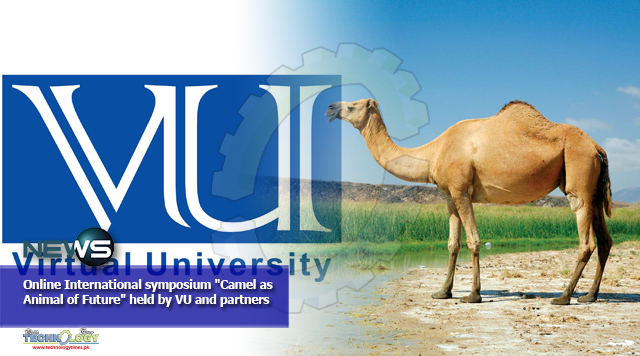The Department of Molecular Biology, Virtual University of Pakistan hosted an Online International Symposium on World Camel Day with a theme of “Camel as the Animal of Future” in collaboration with Camel Association of Pakistan (CAP)

Online International symposium “Camel as Animal of Future” held by VU and partners : The Department of Molecular Biology, Virtual University of Pakistan hosted an Online International Symposium on World Camel Day with a theme of “Camel as the Animal of Future” in collaboration with Camel Association of Pakistan (CAP) and Saudi Geographical Society (SGS) and International Society of Camelid Research and Development (ISOCARD).
Mr. Naeem Tariq, Rector, Virtual University of Pakistan welcomed all participants and panelists for gracing the event. Mr. Muhammad Nawaz gave the inaugural address as chief guest of the seminar followed by messages from Prof. Dr. Muhammad Riaz Virk, Camel Association of Pakistan, Dr. Ali Aldosari, Saudi Geographical Society of Kingdom of Saudi Arabia and Dr. Rafat Al Jassim, ISOCARD.
Scholars from around the globe participated in the international symposium along with a huge number of students, faculty members and stakeholders of camel related industries via online.
Prof. Dr. Muhammad Younas, Patron, Camel Association of Pakistan briefed about how the Camels are made. The Impact of Camels on Climate and Natural Resources was briefed by Dr. Rafat Al Jassim, Nutrition Biochemist & Gut Microbiologist, Australian Institute for Bioengineering and Nanotechnology & Centre for Animal Science, The University of Queensland, Australia.
Dr. Piers Simpkin, Technical Consultant to Frontier Counties Development Consultant (FCDC), Nairobi, Kenya briefed one perspective about the Camel the Animal of the Future. A Sustainable Dairy Animal in Challenging Environments was discussed in detail by Dr. Adul Raziq Kakar, Technical Manager, Camel Farms, Alain Farms for Livestock Production, Alain, U.A.E.
The current and future Camel studies in Saudi Arabia were discussed by Prof. Dr. Mohamed Ahmed Metwaly, Member of Saudi Society of Camel Studies, King Saud University, Saudi Arabia.
Other renowned speakers include: Prof. Dr. Talal A. Abdulkareem, Department of Animal Production, College of Agricultural Engineering Sciences, University of Baghdad, Iraq, Dr. Bernard Faye, Chairman, ISOCARD, France, Dr Tahereh Mohammadabadi, Associate Professor, Department of Animal Science.
Faculty of Animal Science and Food Technology, The Agricultural Sciences and Natural Resources University of Khuzestan, Iran, Dr. Karima Al-Salihi, College of Veterinary Medicine, Al Muthanna University, Iraq, Dr. Pamela Burger, Research Institute of Wildlife Ecology, University of Veterinary Medicine, Vienna, Vienna, Austria, Dr. Han Jianlin, ILRI, Institute of Animal Science, Chinese Academy of Agricultural Sciences (CAAS), China.
At the end Genomic Techniques to explore the Potentials of Camel was briefed by Prof. Dr. Masroor Ellahi Babar, Vice Chancellor, The University of Agriculture, Dera Ismail Khan, Pakistan.
Dean, Faculty of Science & Technology, VUP, Prof. Dr. Muhammad Arif Rafiq thanked all the guest speakers and participants in his address. He appreciated the continued interest and zeal of more than 350 members throughout the day long session who kept the spark alive through exciting questions and answers.
During closing remarks Mr. Naeem Tariq, Rector, Virtual University of Pakistan said that this was a successful event and I heartily congratulate biological department for conducting such an amazing and informative symposium. This event will help many stakeholders to work on this beautiful and multi-talented animal that has opened many doors of opportunities for different industries he added.
At the end of symposium, Dr. Tanveer Hussain, Head of Department of Molecular Biology, VU personally thanked all the speakers and collaborators for sparing time to share knowledge across boarder to get benefit of combined work.
Originally Published at Pakistan OBSERVER